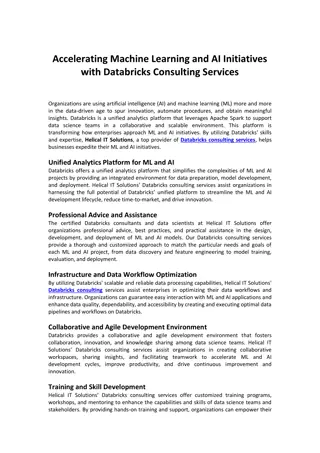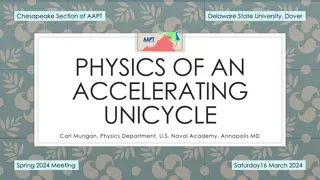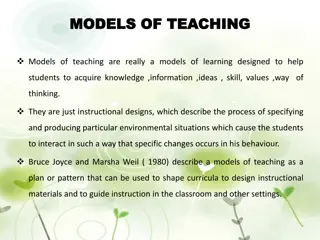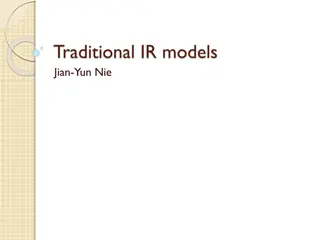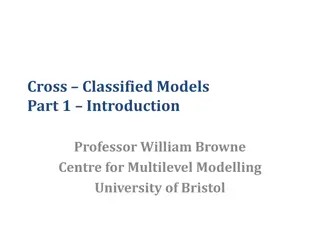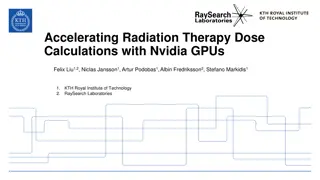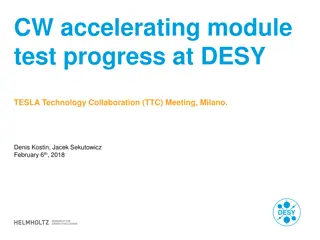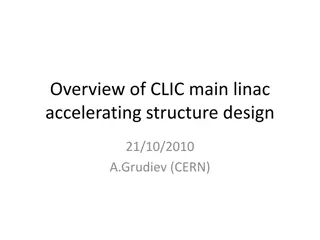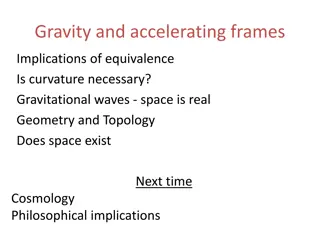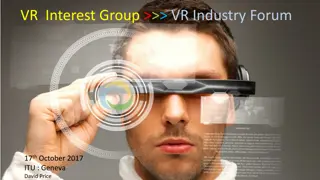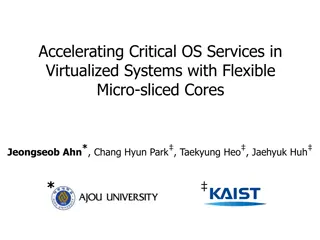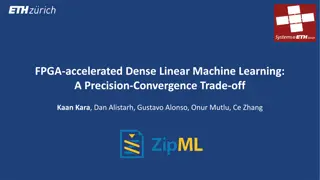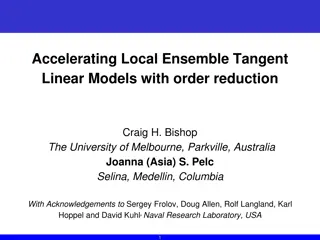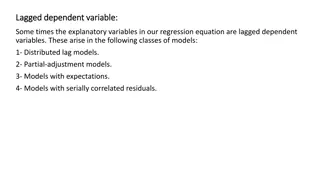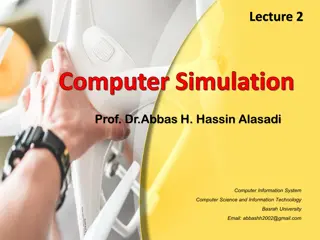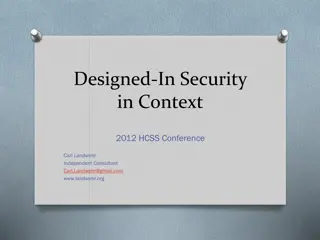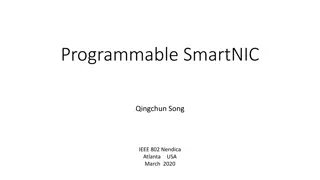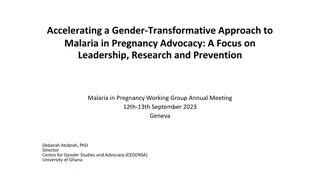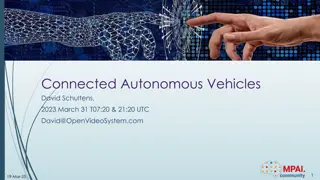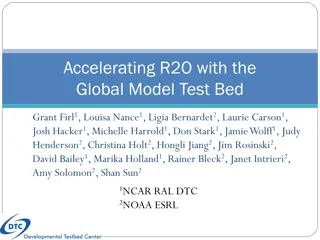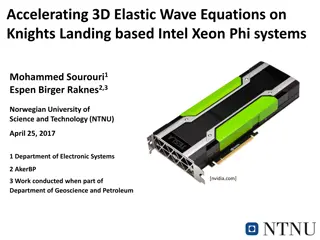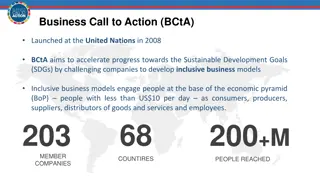Global Climate Models
Scientists simulate the climate system and project future scenarios by observing, measuring, and applying knowledge to computer models. These models represent Earth's surface and atmosphere using mathematical equations, which are converted to computer code. Supercomputers solve these equations to pr
5 views • 15 slides
System Models in Software Engineering: A Comprehensive Overview
System models play a crucial role in software engineering, aiding in understanding system functionality and communicating with customers. They include context models, behavioural models, data models, object models, and more, each offering unique perspectives on the system. Different types of system
6 views • 33 slides
Accelerating Machine Learning and AI Initiatives with Databricks Consulting
Accelerating machine learning and AI initiatives requires a strategic approach, expert guidance, and the right technology platform. Databricks\u2019 unified analytics platform, coupled with Helical IT Solutions\u2019 Databricks consulting services, offers organizations a powerful combination to stre
5 views • 2 slides
Regional Experiences in Sustainable Development for Accelerating SDGs Progress
Catalyzing transformative actions and integrated approaches to sustainable development is crucial in the Asia-Pacific region, where megatrends like climate change, digital transformation, and urbanization are shaping the future. The region faces challenges in attaining the SDGs by 2030, but through
6 views • 12 slides
The Physics of an Accelerating Unicycle
Explore the intriguing concept of an accelerating unicycle in the field of physics, diving into topics such as static friction, rolling motion, and torque analysis. Discover how the interplay between forward translational acceleration and angular deceleration affects the dynamics of a unicycle, with
6 views • 16 slides
Models of Teaching for Effective Learning
Models of teaching serve as instructional designs to facilitate students in acquiring knowledge, skills, and values by creating specific learning environments. Bruce Joyce and Marsha Weil classified teaching models into four families: Information Processing Models, Personal Models, Social Interactio
1 views • 28 slides
Significance of Models in Agricultural Geography
Models play a crucial role in various disciplines, including agricultural geography, by offering a simplified and hypothetical representation of complex phenomena. When used correctly, models help in understanding reality and empirical investigations, but misuse can lead to dangerous outcomes. Longm
1 views • 8 slides
Cathode Ray Tubes (CRT) in Oscilloscopes
Cathode Ray Tubes (CRTs) are key components in oscilloscopes, modulating and accelerating electron beams to create images of electrical waveforms, radar targets, and more. Unlike TVs, CRTs in oscilloscopes use electrostatic deflection for precise beam control. The electron gun assembly consists of a
1 views • 18 slides
Enhancing Information Retrieval with Augmented Generation Models
Augmented generation models, such as REALM and RAG, integrate retrieval and generation tasks to improve information retrieval processes. These models leverage background knowledge and language models to enhance recall and candidate generation. REALM focuses on concatenation and retrieval operations,
2 views • 9 slides
Accelerating Game Design: Practical Workshop Overview
Explore a practical workshop outline for accelerating game design, focusing on ideation, user stories, and iterative processes. Learn about ideation cards, their usability, and enhancing game concepts for future projects. Delve into challenges faced post-game release and iterate successful elements
0 views • 22 slides
Observational Constraints on Viable f(R) Gravity Models Analysis
Investigating f(R) gravity models by extending the Einstein-Hilbert action with an arbitrary function f(R). Conditions for viable models include positive gravitational constants, stable cosmological perturbations, asymptotic behavior towards the ΛCDM model, stability of late-time de Sitter point, a
1 views • 12 slides
Global Economic Update: High-income Economies Accelerating, Developing Countries Facing Challenges
The global economic outlook presents a contrast between high-income economies accelerating in growth while developing countries encounter challenges due to headwinds and capacity constraints. Key messages highlight the need for structural reforms to enhance outcomes. Risks include fallout from the s
4 views • 34 slides
Accelerating Lemma Learning Using Joins in Satisfiability Modulo Theories
Explore the use of joins in accelerating lemma learning within the context of Satisfiability Modulo Theories (SMT). The study covers various SMT applications at Microsoft and delves into the development of the Z3 solver. Key topics include theories, arithmetic operations, array theory, uninterpreted
0 views • 25 slides
Information Retrieval Models and Processes
Delve into the world of information retrieval models with a focus on traditional approaches, main processes like indexing and retrieval, cases of one-term and multi-term queries, and the evolution of IR models from boolean to probabilistic and vector space models. Explore the concept of IR models, r
1 views • 65 slides
Cross-Classified Models in Multilevel Modelling
Cross-classified models in multilevel modelling involve non-hierarchical data structures where entities are classified within multiple categories. These models extend traditional nested multilevel models by accounting for complex relationships among data levels. Professor William Browne from the Uni
2 views • 13 slides
Accelerating Radiation Therapy Dose Calculations with Nvidia GPUs
Accelerating Radiation Therapy Dose Calculations with Nvidia GPUs by Felix Liu, Niclas Jansson, Artur Podobas, Albin Fredriksson, and Stefano Markidis discusses the utilization of GPU technology to improve efficiency in radiation treatment planning. The process involves creating patient-specific tre
0 views • 18 slides
Progress Update on CW Accelerating Module Test at DESY
Progress update on the CW accelerating module test at DESY, including milestones, test progress, and recent changes. Key highlights include testing in CW and long-pulse modes, achieving high gradients, stability measurements, and mechanical adaptations for improved performance. The update outlines a
0 views • 13 slides
Overview of CLIC Main Linac Accelerating Structure Design
Detailed discussion on the RF design constraints, beam dynamics, and structure optimization for the CLIC main linac accelerating structure. The analysis covers parameters such as bunch population, wake suppression, RF breakdown, and surface heating constraints. Additionally, the first generation of
2 views • 26 slides
Gravitational Effects and Space Curvature in Accelerating Frames
Explore the implications of equivalence in gravitational effects like redshift, time-warp, and space-warp in accelerating frames. Understand how the curvature of space is linked to non-uniform gravitational fields. Dive into observations confirming these phenomena, shedding light on the nature of sp
1 views • 30 slides
Accelerating Auto Sales and Industry Trends
Auto sales are rapidly accelerating in 2021 despite challenges like a microchip shortage affecting production. Q1 2021 saw a strong increase in sales, with a shift in buyer considerations towards factors like durability, comfort, and technology. Dealerships are adapting to changing trends, increasin
0 views • 16 slides
Composite Models in Building Complex Systems
Composite models are essential in representing complex entities by combining different types of models, such as resource allocation, transport, and assembly models. Gluing these models together allows for a comprehensive representation of systems like the milk industry, where raw materials are trans
0 views • 27 slides
Accelerating VR Industry Growth: Transition from VR Interest Group to VR Industry Forum
The VR Interest Group is transitioning into the VR Industry Forum to boost the growth of the VR industry by facilitating collaboration, setting standards, and accelerating adoption. With a focus on removing hurdles and benefiting both industry stakeholders and consumers, the formal organization aims
0 views • 14 slides
Accelerating Critical OS Services in Virtualized Systems
The research discusses accelerating critical OS services in virtualized systems using flexible micro-sliced cores. Challenges in server consolidation, tackling virtual time discontinuity, shortening time slice, and dividing CPUs into pools are highlighted. The approach involves serving critical OS s
0 views • 19 slides
Efficient Training of Dense Linear Models on FPGA with Low-Precision Data
Training dense linear models on FPGA with low-precision data offers increased hardware efficiency while maintaining statistical efficiency. This approach leverages stochastic rounding and multivariate trade-offs to optimize performance in machine learning tasks, particularly using Stochastic Gradien
0 views • 26 slides
Accelerating Local Ensemble Tangent Linear Models
This research focuses on accelerating Local Ensemble Tangent Linear Models with order reduction, exploring methods, results, and implications for advancing numerical modeling in atmospheric and oceanic systems. The study addresses challenges in maintaining accurate TLMs and adjoints for coupled mode
1 views • 21 slides
Accelerating Systemic Change Network Inaugural Workshop Overview
The Accelerating Systemic Change Network (ASCN) held its inaugural workshop in July 2016 at the Howard Hughes Medical Institute. The event focused on introducing ASCN, its goals, and working group topics to facilitate collaboration among change researchers in higher education. ASCN aims to be a prof
0 views • 22 slides
Accelerating Systemic Change Network Inaugural Workshop Summary
The Accelerating Systemic Change Network held its inaugural workshop at Howard Hughes Medical Institute in July 2016 to address the lack of coordination in improving higher education. With a vision to become a professional hub for change researchers in STEM education, the network aims to enhance ind
0 views • 5 slides
Fast Background Subtraction Using CUDA: Accelerating Foreground Detection
Background subtraction is a vital step in computer vision, enabling the identification of foreground pixels in dynamic scenes. Traditional methods face challenges due to illumination changes, camera issues, and background object variations. Current approaches like Gaussian Mixture Models (GMM) offer
1 views • 26 slides
Accelerating Localisation through Partnerships: Key Activities & Guidance Note
This content outlines a partnership initiative focusing on accelerating localisation in humanitarian response through key activities like research, capacity assessments, and framework development. It also provides guidance notes for implementing effective partnership practices, targeting various sta
0 views • 11 slides
Lagged Dependent Variable Models in Regression Analysis
Lagged dependent variables are utilized in various regression models such as distributed lag models, partial-adjustment models, models with expectations, and models with serially correlated residuals. By incorporating lagged dependent variables, researchers can analyze the impact of past values on t
0 views • 11 slides
Computer Simulation Models Classification
Computer simulation models are classified based on various characteristics such as static or dynamic, deterministic or stochastic, and discrete or continuous. Static models represent systems at a specific point in time, while dynamic models depict changes over time. Deterministic models involve no r
0 views • 8 slides
Designed-In Security in Context 2012 HCSS Conference
Four Thrusts: Inducing Change, Developing Scientific Foundations, Maximizing Research Impact, Accelerating Transition to Practice. Inducing Change by disrupting the status quo with different approaches. Developing Scientific Foundations in cybersecurity through a disciplined scientific approach. Ma
0 views • 14 slides
SmartNIC: Programmable Device Accelerating Network Functions
SmartNIC is a programmable device complementing CPU/GPU by offloading and accelerating network applications. It features a unique architecture allowing for independent application running and control/data plane separation. SmartNIC offers capabilities such as OVS offload, PCIe device emulation for N
0 views • 8 slides
Accelerating Access to IVDs through Collaborative Registration Procedure
This content discusses the Collaborative Registration Procedure (CRP) for In Vitro Diagnostics (IVDs), aiming to expedite national registration of quality-assured IVDs. Through information sharing between WHO Prequalification (PQ) and National Regulatory Authorities (NRAs), the CRP facilitates a sho
0 views • 4 slides
Gender-Responsive Malaria Advocacy: Accelerating Progress
Accelerating gender-transformative approaches in malaria advocacy, focusing on leadership, research, and prevention in pregnancy. Strategies include promoting gender-balanced representation, deploying gender champions, and enhancing gender responsiveness in all aspects of malaria research ecosystem.
0 views • 10 slides
Accelerating 3D Seismic Wave Simulations on Intel Xeon Phi Systems
Explore how the use of KNL-based Xeon Phis accelerates 3D seismic wave simulations. This presentation showcases the results and efficiency of utilizing Xeon Phi architecture for seismic wave modeling and analysis. Learn about the advancements in accelerating 3D elastic wave equations on Knights Land
0 views • 16 slides
Refined AI Models for Connected Autonomous Vehicles
Enhance your understanding of connected autonomous vehicles with collaboratively refined AI models. Learn about partitioning AIM component revisions, improved interfaces, and licensed frameworks crucial for CAV safety, reliability, and explainability. Explore the evolution of CAV standards and the r
0 views • 14 slides
Accelerating R2O with the Global Model Test Bed and NGGPS Overview
This content discusses the initiatives Accelerating R2O and NGGPS which aim to enhance forecast guidance systems utilizing the Global Model Test Bed. It covers the development, testing, and selection of components for the Next Generation Global Prediction System, along with the role of the Common Co
0 views • 14 slides
Accelerating 3D Seismic Wave Simulations on Xeon Phi Systems
Explore the use of Knights Landing (KNL) based Xeon Phis for accelerating 3D seismic wave simulations. This presentation delves into the Xeon Phi architecture and showcases the results obtained from the 3D seismic wave simulator, focusing on optimizing performance and efficiency for seismic data pro
0 views • 16 slides
Accelerating Sustainable Development Goals through Inclusive Business Models
Business Call to Action (BCtA), launched at the United Nations in 2008, challenges companies to develop inclusive business models engaging individuals at the base of the economic pyramid. With a focus on the Sustainable Development Goals (SDGs), BCtA has impacted over 200 million people across 68 co
0 views • 4 slides


